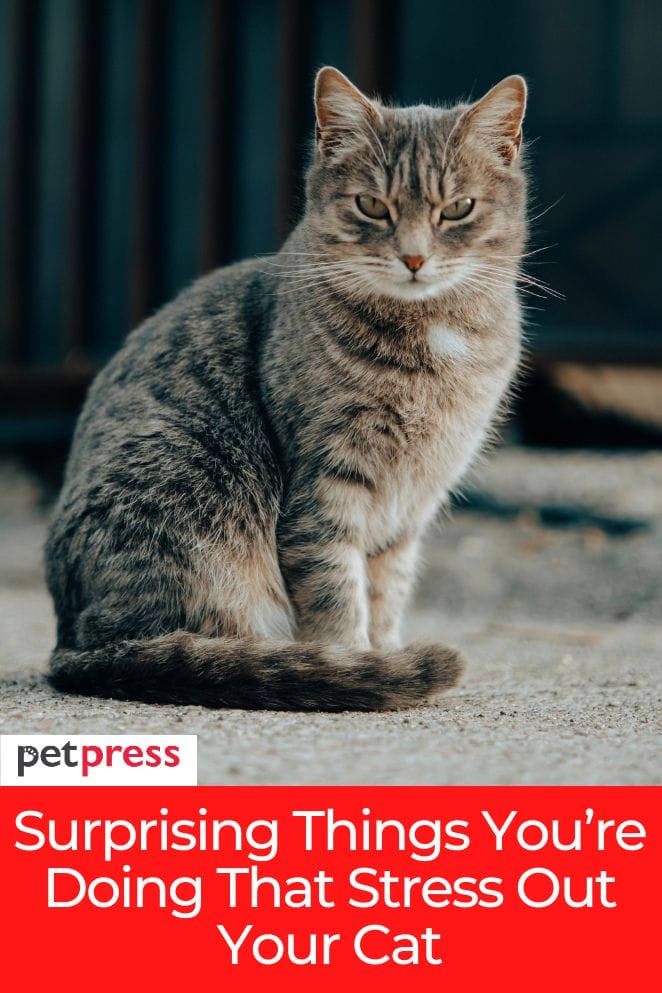
Cats are adorable, independent, and sometimes quirky companions.
While we often try our best to keep them happy, some of our actions, even unintentional ones, can actually cause stress.
Cats may not express their discomfort the same way humans do, but stress can negatively impact their well-being.
In this post, we’ll explore surprising things you might be doing that could stress out your cat—and how to fix them.
Ignoring Litter Box Maintenance
A dirty litter box is one of the biggest stress triggers for cats.
Think about it—using a filthy bathroom wouldn’t feel great for you, and it’s no different for your cat.
Cats are naturally clean creatures, and if their litter box isn’t kept tidy, they may avoid it altogether and find another place to go.
Key points
- Cleanliness is crucial: The ASPCA recommends scooping the litter box at least once a day and replacing the litter completely every week.
- Number of boxes matters: For homes with multiple cats, you should have one litter box per cat, plus one extra.
How to solve the problem
- Scoop daily: Removing waste each day keeps the box clean and inviting for your cat.
- Deep clean weekly: Scrub the box and replace the litter entirely to maintain hygiene.
- Choose the right spot: Place the box in a quiet, easy-to-reach location to ensure your cat feels comfortable using it.
- Experiment if needed: If your cat avoids the litter box, try changing the type of litter. Some cats have strong preferences for specific textures or scents.
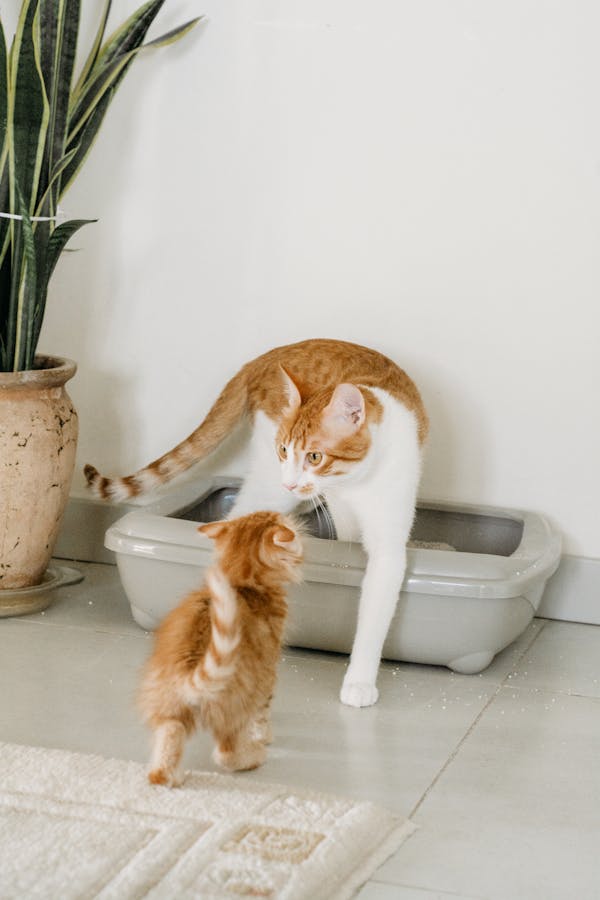
Changing the Environment
Cats are creatures of habit, and they feel most secure when their surroundings stay consistent.
Sudden changes, like rearranging furniture, moving to a new house, or bringing in a new pet, can make them feel anxious and overwhelmed.
How cats react to stressful changes
- Hiding: Your cat may retreat to a safe, hidden spot.
- Loss of appetite: Stress can make them refuse food.
- Aggression: They might lash out as a way to cope with their discomfort.
How to Help Your Cat Adjust
- Take it slow: When moving to a new home, allow your cat to explore one room at a time. Gradually introduce them to the rest of the space once they seem comfortable.
- Provide comfort: Use calming aids like pheromone diffusers to create a sense of safety during transitions. These products mimic natural cat scents that help reduce anxiety.
Loud Noises and Sudden Sounds
Sounds like vacuum cleaners, fireworks, thunderstorms, or even loud conversations can make them feel scared or anxious.
Why do cats react strongly to noise?
Cats can hear sounds at much higher frequencies than we can—up to 64,000 Hz, compared to the human range of 20,000 Hz.
This means that what seems like a normal sound to us might feel overwhelming or even startling to them.
How to help your cat stay calm
- Create a quiet retreat: Set up a safe, cozy space where your cat can escape during noisy events. A quiet room with their favorite blanket or bed can work wonders.
- Soundproof when possible: If loud noises are common in your home or neighborhood, consider soundproofing a room or adding thick curtains and rugs to help reduce the noise levels.
Overstimulating Playtime
Playtime is crucial for keeping your cat happy and healthy, but too much or overly rough play can overwhelm them.
When play gets too intense, it can cause stress and even make your cat act defensively.
How to recognize overstimulation
- Biting or scratching: These are common signs that your cat is feeling overwhelmed.
- Disengaging: Your cat might stop playing abruptly or walk away when they’ve had enough.
How to keep playtime positive
- Watch their body language: Learn to recognize when your cat is getting overstimulated, such as flicking their tail or flattening their ears. Stop the play before it escalates.
- Choose safe toys: Use interactive toys like feather wands or laser pointers to keep play fun without putting your hands in harm’s way.
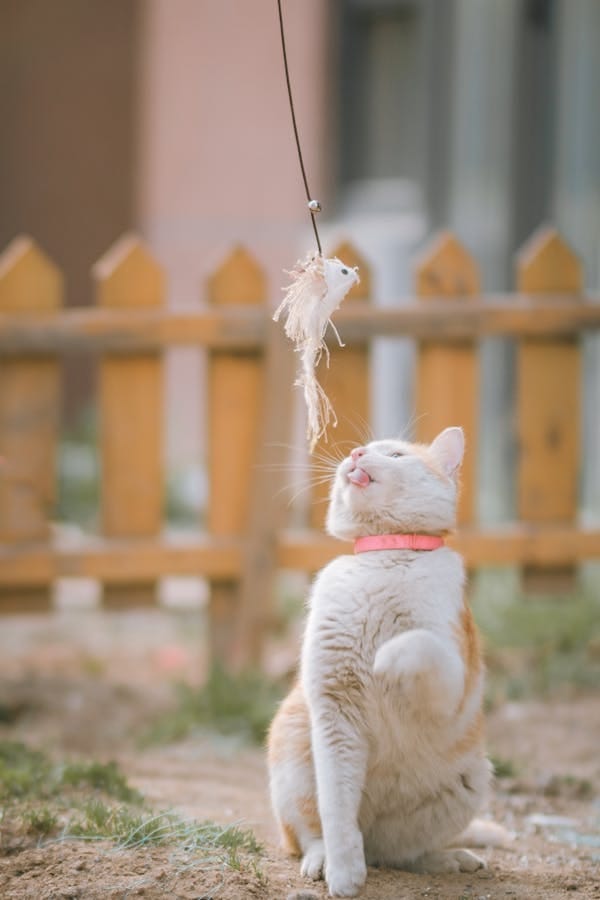
Neglecting Routine
Cats thrive on routine.
They feel safest and happiest when their day is predictable.
Disruptions—like irregular feeding times, inconsistent attention, or changes in sleep patterns—can confuse and stress them out.
Why routine matters?
Research shows that predictable routines help reduce anxiety in cats.
A 2021 study in Frontiers in Veterinary Science found that cats feel calmer when they know what to expect in their daily lives.
How to keep your cat’s routine stable
- Be consistent: Feed, play, and interact with your cat at the same times each day. This helps them feel secure and cared for.
- Plan ahead if you’re away: Use an automatic feeder to maintain regular meal times or hire a pet sitter to keep their schedule intact.
Inadequate Socialization
Cats that don’t get enough social experiences as kittens may struggle with fear or stress later in life.
This can make situations like meeting new people or being around other animals overwhelming for them.
Why early socialization is key?
The American Veterinary Medical Association (AVMA) explains that the most important time for socializing kittens is between 2-7 weeks of age.
During this window, exposing them to different people, sounds, and environments helps them grow into more confident and well-adjusted adults.
How to help
- For kittens: Introduce them to a variety of experiences early on—like meeting gentle people, hearing household noises, and exploring safe spaces. These experiences will help them adapt more easily as they grow.
- For adult cats: Take it slow. Use positive reinforcement, like treats and praise, to help them feel safe when faced with new situations or people. Patience is key to building their confidence.
Not Providing Enough Enrichment
Cats need mental and physical stimulation to stay happy and healthy.
Without enough to do, they can get bored, which might lead to destructive behaviors like scratching furniture or knocking things over.
In some cases, they may even become stressed, lethargic, or depressed.
How to enrich your cat’s life
- Provide climbing opportunities: Cat trees or shelves give them a chance to climb and explore, which helps satisfy their natural instincts.
- Offer puzzle feeders: These keep your cat’s mind active by making them work for their food.
- Set up a window perch: Cats love watching the world go by—whether it’s birds, squirrels, or just people walking by.
Easy Ways to Keep Things Fresh
- Rotate toys: Changing out toys regularly makes them feel new and exciting.
- Schedule daily playtime: Interactive play with feather wands, laser pointers, or other toys helps strengthen your bond and keeps your cat engaged.
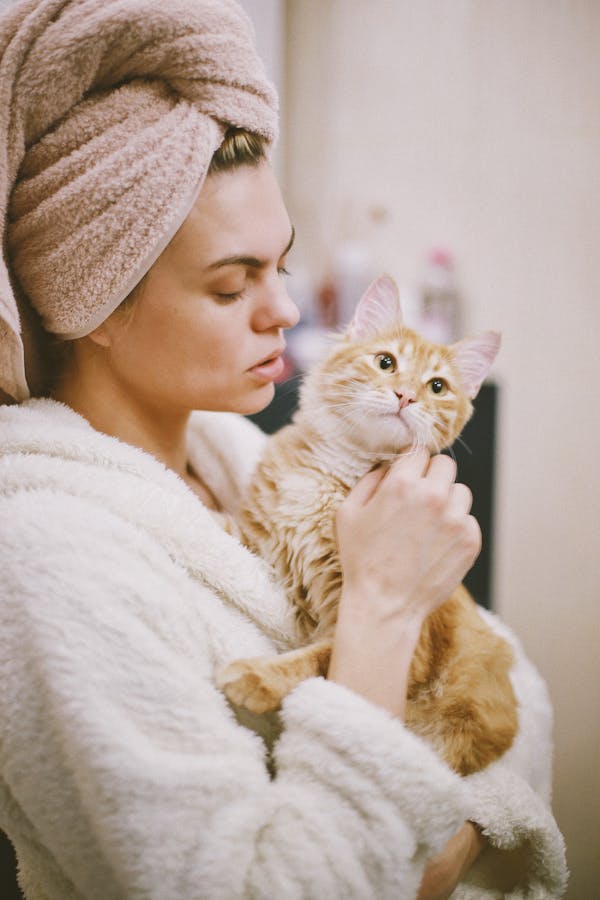
Excessive Petting
While many cats enjoy affection, not all cats like being petted for long periods.
Some cats prefer limited physical contact, and over-petting can cause them to feel overstimulated or uncomfortable.
Understanding your cat’s preferences
A 2018 study in Applied Animal Behaviour Science found that cats typically enjoy short, gentle petting sessions, especially around their head and cheeks.
These areas are where they have scent glands, and they enjoy being petted there.
How to respect your cat’s boundaries
- Watch their body language: Cats communicate a lot through their movements. If your cat flicks their tail, flattens their ears, or pulls away, it’s a clear sign they’ve had enough.
- Stop when needed: If you notice signs of discomfort, it’s time to stop petting to prevent overstimulation.
Poor Handling Techniques
How you handle your cat is important for their comfort and well-being.
Picking them up the wrong way or restraining them too much can cause stress and physical discomfort.
Common mistake
One common mistake is lifting a cat by the scruff of their neck, which is okay for kittens but can be painful and harmful for adult cats.
This can make them feel insecure and stressed.
How to handle your cat properly
- Support their body: Always lift your cat by supporting both their chest and hindquarters. This provides stability and makes them feel safer.
- Be gentle: Handle your cat with care and avoid forcing them into situations they’re uncomfortable with. Forcing a cat to do something they don’t like can increase their anxiety and stress.
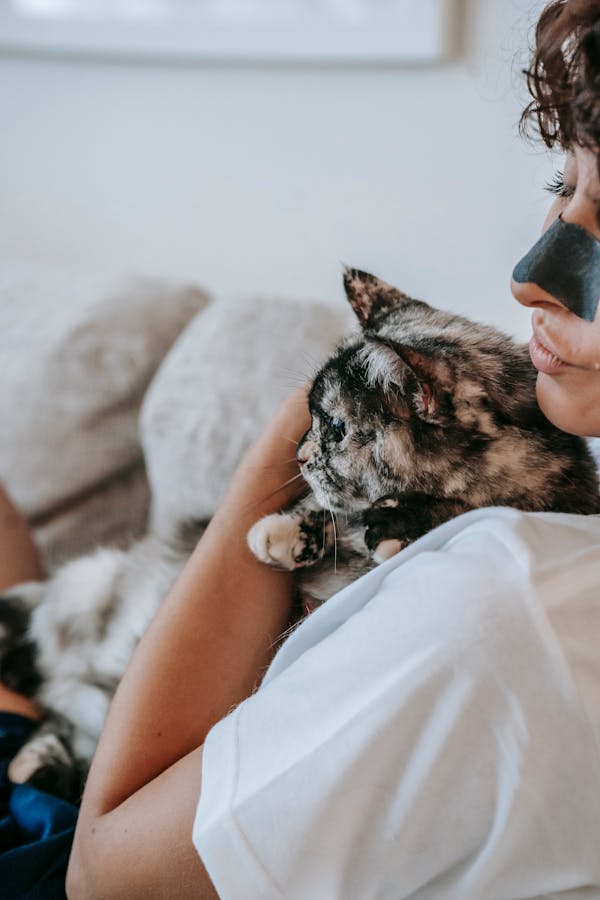
Final Thoughts
Your cat’s happiness and well-being depend on understanding what might stress them out.
By paying attention to their needs and creating a comfortable, secure environment, you can make a big difference in their life.
Cats rely on us to take care of both their physical and emotional needs, and small, mindful actions can help them feel safe, loved, and content.
FAQs
Common signs include hiding, reduced appetite, excessive grooming, aggression, or changes in litter box habits.
Yes. Chronic stress can lead to health issues like urinary tract infections, digestive problems, or weakened immunity.
Provide a safe space, use calming products like pheromone sprays, and maintain a consistent routine.
Absolutely. If stress symptoms persist, a vet can rule out medical issues and suggest behavior management strategies.
- Does Cat Litter Melt Ice? The Complete Guide to Winter Safety - January 30, 2026
- Happy Tail Dogs: Understanding This Common Canine Condition - January 29, 2026
- How Cold Can Outdoor Cats Handle? Feline Winter Safety - January 27, 2026


GIPHY App Key not set. Please check settings